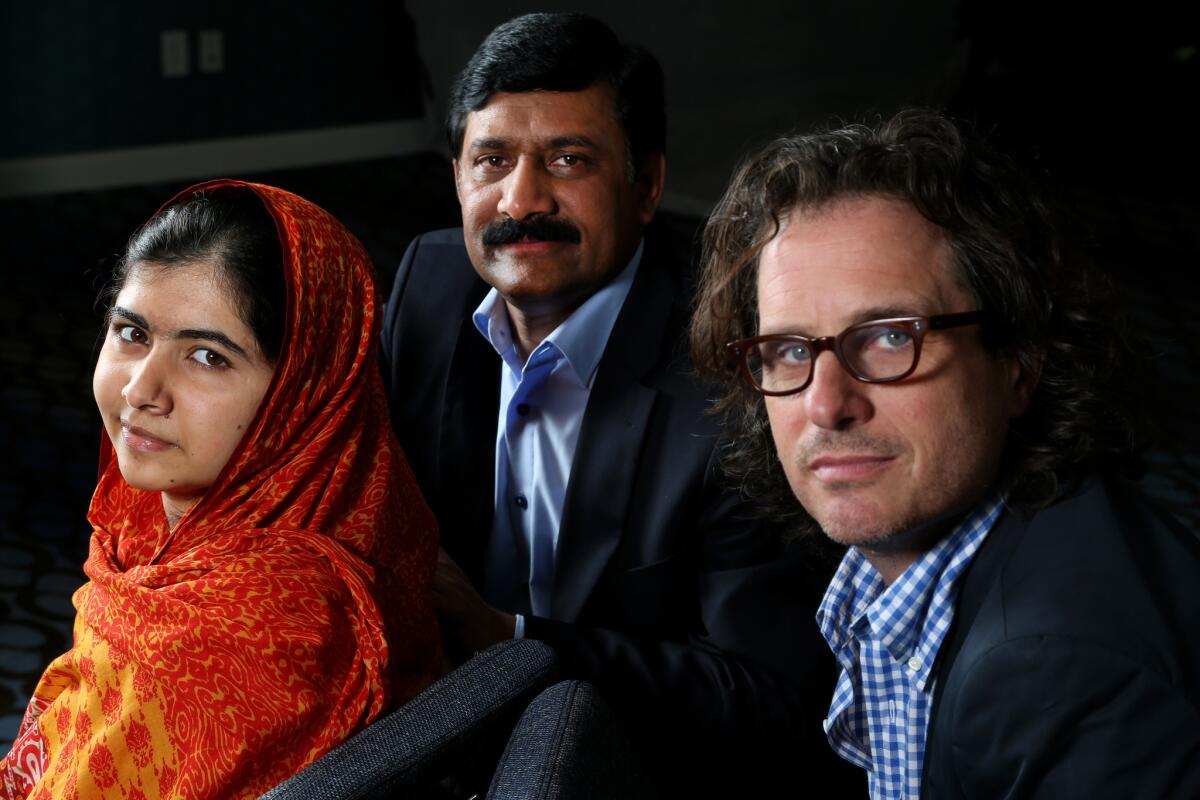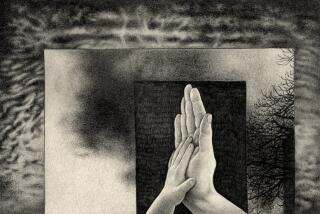Youngest Nobel winner Malala Yousafzai adds screen star to legend

Pakistani teenager Malala Yousafzai, left, has emerged as a leading advocate for children’s rights and the youngest-ever Nobel Peace Prize laureate. She is with her father Ziauddin Yousafzai, and director Davis Guggenheim, right.
- Share via
She moves in orange and saffron and gold embroidered threads. She wears no rings, no makeup. Her toenails are painted pink. She may have a crush on Roger Federer, but she is shy about such things. Her wit is sharp, her memories clear. What once was, she says, may never be again, and in this wisdom one can see that the youngest recipient of the Nobel Peace Prize is a woman now.
Before the Taliban bullet that nearly killed her, and the fame that followed, Malala Yousafzai was born in the mountains of Pakistan, where her father wrote her name in a family tree that for generations had listed only men. It was a brave declaration, as if he knew what lay ahead: a wounded child growing into an eloquent voice for human rights that would challenge presidents, stand against extremists and charm the world.
That story is told in “He Named Me Malala,” a documentary that traces Malala’s early years in the Swat Valley, her shooting and recovery, and her family’s exile to England, where she runs a fund to empower girls through education. Directed by Academy-Award winner Davis Guggenheim, the Fox Searchlight film, which opens in Los Angeles on Oct. 2, is a parable that blends mythical animation with a girl’s rise from rural obscurity to advising President Obama to send pens and books, not drones, to Pakistan.
SIGN UP for the free Indie Focus movies newsletter >>
“It’s hard to watch your own movie,” said Malala, who was awarded the Nobel Prize last year when she was 17. “I feel a bit embarrassed when I am sitting there [and] I see myself talking and looking at myself on screen.”
The film centers on Malala’s relationship with her father, Ziauddin, a teacher and education activist in northwest Pakistan, where tradition and the Taliban kept many girls from school. A father’s aspiration became the ambition of his daughter, a preternaturally gifted child who spoke with disarming poetry and conviction and posted an online diary about life under extremism.
“We became dependent on each other,” said Ziauddin, “like one soul in two different bodies.”
Named after a 19th century heroine in tribal folklore, Malala, who was shot in the head in 2012 in the attack, said she admired her father but was not manipulated by him. “I chose this life, and I must stand in it,” she says in the film. In an interview, Ziauddin, who was threatened with assassination for his support of women’s rights, said: “Right in my home was a great leader. I did not stop her.”
In each other’s company, father and daughter act as co-conspirators, joking and exchanging sly asides as if in a language known only to them. That devotion steels them against enemies at a time of widening Islamic radicalism. It is still unsafe for the family to return to the Swat Valley; eight of the 10 men convicted in the assault had their verdicts overturned recently and were set free. While much of Pakistan reveres her, an education organization criticized her memoir, “I Am Malala”, as anti-Islamic and suggested she is a pawn of the West.
“I am fighting against an ideology that stops and denies women’s rights,” she said in an interview in Santa Monica, where she and Ziauddin were busy with the demands of marketing a movie, including scheduling festival appearances amid the kind of political pressures that aren’t typical for Hollywood studios. “Criticism will always be there if you’re thinking of politics or bringing change to your country.... It doesn’t matter what people are saying. I am following on my mission to see that every child gets a quality education.”
She enters a room with a slight rustle of air. Dark hair peeks from a scarf, and her hands flutter as if small wings when she speaks. Her words are precise and move like currents, gathering force. She wants to one day lead her country with “the love a mother would give to her child.” A bashful smile appears when she says such things, and despite her finesse on the world stage, she still carries a book bag, has trouble with physics and is only an echo beyond girlhood.
She is petite, listens with grace and understands the whims of nations with the skill of a political operative.
“If we keep on ignoring Syria, Iraq, Pakistan, Afghanistan,” she said, “then this world will not become better.” When asked what role the U.S. and Western powers might play in stopping conflicts, she added: “So much is spent on military [solutions]. I’m not in favor of spending money on arms because I myself was attacked with a gun, and I’m not just one girl who was attacked. Many hundreds and thousands of people are suffering.”
On children lost to radicalism, she said: “Whenever you see these young children becoming suicide bombers, they are not in school. They have no other way of doing work. They have no dream at all. They don’t have a dream to be a doctor or a teacher or anything they want. Then they think, ‘Let’s pick up a gun and I’m serving my religion.’ They can be easily indoctrinated.”
Poverty and corruption have spoiled the lives of millions in her native land. “In Pakistan, we haven’t really seen honest leaders,” she said, “so it’s hard for the people of Pakistan to trust anyone.”
Her charisma has the pull of a stiff wind. It is hard to imagine a Hollywood actress portraying Malala, a prospect that convinced the film’s co-producers, veterans Walter Parkes and Laurie MacDonald, to make a documentary instead of a feature. The movie is a glimpse at her private world: the playful chiding between her and her two brothers, her mother’s struggle to adapt to life in Britain, scenes of her physical rehabilitation after her shooting, her humanitarian trips to Jordan and Nigeria, and the free-flowing camaraderie with her father.
“What was this thing that happened between father and daughter? What is it that produced this remarkable girl? As a father right now, I want to know,” said Guggenheim, who won an Academy Award for his 2006 environmental documentary “An Inconvenient Truth.” The director said he focused on the relationship to give a human dimension to the intractable politics of the region. “I had to find,” he said, “another way to unlock this story.”
With a thick mustache and quick eyes, Ziauddin, who overcame a severe stutter, ran a school and provoked the anger of the Taliban with his calls for girls’ education. He was known across the Swat Valley and was often threatened. His activism inspired his daughter, who in her preteens lectured tribal men about civil rights and became the embodiment of his vision and a potent attraction for international media.
SIGN UP for the free Essential Arts & Culture newsletter >>
“He Named Me Malala” explores the courage and fears — re-created, at times, by animation — as father and daughter challenged the Taliban. Radicals blew up schools and killed friends. Few suspected, though, that they would target a girl. The family believed that Ziauddin, who criticized the essence of a patriarchal society, was the most in danger. But on Oct. 9, 2012, a gunman identified Malala on a bus and fired several shots, one of them striking the left side of her forehead.
“Me and my wife, we cried all the night,” Ziauddin says. “The doctors told me she will survive, but she may not be the same as she was.”
Her left cheek is stiff from bullet damage, and at times her face has the stillness of a painting. Malala said that she, not her father, chose the activist spirit that came with her name: “My father only gave me the name Malala; he didn’t make me Malala.”
She wanted to be a doctor, but that, along with so much else in recent years, has changed.
“Why can’t a woman be a politician? Why can’t she be a leader?” she said in an interview, noting that she admired former Pakistani Prime Minister Benazir Bhutto, who was assassinated in 2007. “I need to become the prime minister of my country and make my country better.”
Malala stays in touch with her friends in Pakistan, urging them to remain in school despite family pressures to marry and have children.
“It is sometimes tragic” when they drop out, she said. Malala is studying history and economics and will soon attend univrsity. When there’s a quiet moment amid the clamor of her travels and demands, she reads books. “The Alchemist” by Paulo Coelho is her favorite.
“Reading is a very good way to come out of your own life and go into another life story,” she said. “I am in that story in the book, and I feel a part of it.”
She paused and spoke of the mountains and fields of the Swat Valley. The sky, the dust, the part of her that is gone. The future, she said, can’t be built thinking too much of the past. But a girl who grew into a woman in exile carries memories of a distant place.
“I remember especially when we went on a school trip and I was with my friends,” she said. “My father was giving a lecture to girls standing on this big stone. I and my friends we went, and we were singing songs, and I love and remember that moment very well. Being in that heaven, that paradise.”
More to Read
Only good movies
Get the Indie Focus newsletter, Mark Olsen's weekly guide to the world of cinema.
You may occasionally receive promotional content from the Los Angeles Times.











